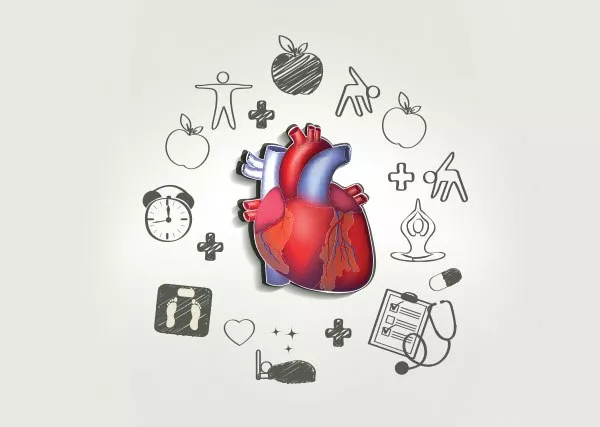Major risk factors that increase the risk of heart disease include high blood pressure or hypertension, high cholesterol, obesity, diabetes, lack of physical activity, and most importantly the use of tobacco. Another important risk factor that cannot be changed is a family history of early heart disease. However, the good news is that most of you can do something to help reduce the risk factors and your chances of suffering from heart disease by changing your lifestyle. For personalized guidance, you may consult a cardiologist in Kochi Kerala.
Follow a workout plan–
Studies clearly show that regular and mild exercise helps the heart. Exercises such as walking, swimming and cycling will help maintain the health of your blood vessels and strengthen the heart muscles. Regular exercise can also reverse some heart disease risk factors and improve cholesterol and fat levels. That will increase your self-confidence, lower your stress, lessen your anxiety and help you sleep better, all of which will benefit your heart. For expert advice, you can visit a heart hospital in Kochi Kerala.
Maintain a healthy diet –
A healthy diet is crucial in the development and prevention of heart disease. Eating a diet high in fresh fruits, vegetables, pulses, and legumes protect your heart. Whole grains, which contain folic acid, B vitamins, fiber and eating nuts, are all important protectors against heart disease. Eating poultry and fish, low-fat dairy products and eggs, which are some of the best sources of protein may also help lower your chances of getting heart disease. For professional dietary counseling, a cardiology hospital in Kochi Kerala can guide you.
If you are a smoker, quit –
Smoking is the most dangerous and known modifiable risk factor for heart disease. People who smoke have a much higher risk of heart disease when compared to nonsmokers. Giving up smoking significantly reduces the risk of a heart attack and is particularly important for those who have other risk factors such as high blood pressure, raised blood cholesterol levels, diabetic or overweight and physically inactive.
Lose weight –
If you are overweight or obese, you are more likely to develop heart disease than someone who is of a healthy weight. Research shows that maintaining a healthy weight cuts your risk of heart disease because it helps prevent and manage conditions like high blood pressure, high cholesterol and type 2 diabetes that put you at a greater risk of heart disease.
Control high blood pressure –
Having high blood pressure increases your chance of having a heart disease. High blood pressure can often be reduced by a healthy diet, moderating your intake of sodium and salt, maintaining a healthy weight and exercising regularly. Other lifestyle changes that can help to reduce blood pressure include quit smoking, reducing stress and reduction in alcohol consumption.
Check your cholesterol levels -
High cholesterol in your blood is another major risk factor leading to heart disease. Too much bad cholesterol or Low-density lipoproteins (LDL) in your blood is unhealthy and blocks the blood from flowing through the arteries. You can control your cholesterol levels through an active and healthy lifestyle. There are no symptoms associated with high cholesterol and therefore, it is important to monitor your levels on a regular basis to keep your cholesterol at healthy levels.
Keep your diabetes under control -
If you have diabetes, you are at least two to four times more likely to develop heart disease than someone without diabetes. Diabetes makes it difficult for the body to control blood sugar levels, which in turn can damage blood vessels. Although diabetes cannot usually be cured, it can be treated and the complications can be prevented. If you have diabetes, you can protect yourself from heart disease by controlling your blood sugar, by losing weight, regular exercise, maintaining a healthy diet and taking medications.
Know your family history –
Your risk of heart disease can run in your family and knowing your family’s history of the disease can help you take steps to reduce the risk of heart disease. If one or more members of your family had a heart attack at an early age (before age 55 for men or 65 for women), you may be at increased risk. It is of vital information to find out if your brothers, sisters, parents or grandparents had heart disease and how old they were when they developed the disease to prevent and manage the disease.





